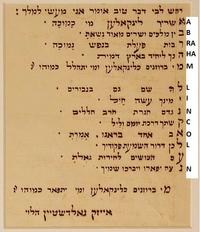This One Book, One Philadelphia season, with its focus on Charles Frazier’s Cold Mountain, has sparked a larger conversation about the book’s setting—the Civil War. Citizens across Philadelphia are learning about the roles our leaders, our city, and even our own ancestors played during this transformative time in our country. In this sprit, last week a group came together at the National Museum of American Jewish History to learn about Jewish American experiences during the Civil War.
The first Jews arrived in American around 1654, after escaping the Inquisition that had filtered from Spain into Portugal. From this beginning, there was a tension in American Jewish communities between trying to be part of this country while still holding onto their own heritage. In European Jewish communities throughout history, Jews were typically not considered part of the general public—they were their own, separate communities within other cities and countries. President George Washington changed that dynamic, writing in a letter to the Hebrew Congregation in Newport, Rhode Island, “The government of the United States, which gives to bigotry no sanction, to persecution no assistance, requires only that they who live under its protection should demean themselves as good citizens.” In calling the American Jews citizens, he opened the door for their full involvement in all matters of civic life—including the coming divisions in the country.
Despite this official political acceptance, there was still anti-Semitism and mistrust toward American Jews, especially in the Abolitionist Movement—where there was concern Jews were looking for ways to make money by smuggling escaped slaves back to the South. Jews had to work to prove their loyalty, both to the country as a whole and to the various factions and groups of which they tried to be a part.
One prominent believer of the idea that Jews were trying to profit from the war was General Ulysses S. Grant—who took the extreme measure of expelling Jews “as a class” from his army territory, which spanned Tennessee, Kentucky, and Mississippi. Upon learning of this action, President Lincoln wrote him a letter firmly rebuking it: “a paper purporting to be [issued by you] has been presented here. It expels all Jews from your department. If such an order has been issued, it will be immediately revoked.” Meeting with Jewish representatives a few days later, Lincoln told them that “to condemn a class is, to say the least, to wrong the good with the bad.” He committed to defend Americans against religious discrimination as well as racial.
Jews themselves were divided over the war. There were 9,000 Jews who served in the Union Army, and 2,000 in the Confederate Army. President of the Confederacy Jefferson Davis chose as his right-hand-man Judah Benjamin, a Jewish senator from Louisiana who went on to become the Secretary of War and then Secretary of State of the Confederacy. Benjamin himself did not own slaves, and he put forward a proposition to emancipate any slave who volunteered to fight for the Confederacy—an idea that was roundly rejected by Southern leaders.
Thanks to his defense of Jewish religious freedoms, Lincoln held a lot of love among American Jews. Just after his assassination, Isaac Goldstein wrote a “Memorial Prayer” that was an acrostic poem of Lincoln’s name.
And thanks to his temporary expelling of the Jews, Grant had to apologize and specially court “the Jewish vote” during his presidential campaign of 1868—the first time the Jews were treated as a political special-interest group.
Debates today still rage about how to be “fully American” while still honoring one’s heritage. Traveling back through time to understand some of the beginnings of this debate can help us see how far we’ve come—and how far we still have to go.
For a full list of One Book events, visit our online calendar or download our printed guidebook.
Have a question for Free Library staff? Please submit it to our Ask a Librarian page and receive a response within two business days.


